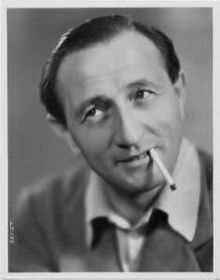Carmine Gallone
| Carmine Gallone | |
|---|---|
 |
|
| Born |
10 September 1885 Taggia, Liguria, Italy |
| Died | 4 April 1973 (aged 86) Frascati, Latium |
| Occupation |
Film director Screenwriter |
| Spouse(s) | Soava Gallone |
Carmine Gallone (10 September 1885 in Taggia, Liguria, Italy – 4 April 1973 in Frascati, Italy) was an early acclaimed Italian film director, screenwriter, and film producer. Considered one of Italian cinema's top early directors, he directed over 120 films in his fifty-year career between 1913 and 1963.
Carmine Gallone was born on 10 September 1885 in Taggia (in the province of Imperia), but grew up in Naples. His father was Italian, from Sorrento, and his mother was French, from Nice. He began writing plays at 15 and in 1911 won first prize at a national drama competition for his drama Brittanico.
He later moved to Rome where in 1912 he was hired as a general worker by the Teatro Argentina company, all the while continuing to write plays. In the same year he had his first experience working in film at the Cines studio. In 1912 he also met and married the Polish actress Stanislava Winaver, better known to the public as Soava Gallone, whom he directed in many of his films.
Promoted to director at Cines, he directed thirteen titles in 1914 alone, including Amore senza veli, Il romanzo di un torero, La donna nuda and Le campane di Sorrento. In 1915 he was selected to direct the film Avatar.
In 1918 he made his most successful film to date, Redenzione (Redemption) for the Medusa Film company. The film had a great success with audiences and critics. In 1924, together with Augusto Genina he directed Il corsaro. The following year due to the Italian film industry's troubles Gallon moved abroad where he worked for many years in France, Germany, England and Austria.
Due to his predilection for historical epics he was compared to Cecil B. DeMille. His best remembered films like Gli ultimi giorni di Pompei (The Last Days of Pompeii) in 1926 and many years later, the massive epic Scipione l'Africano in 1937, were used to enhance the imperial aspirations of the Mussolini regime, through the depiction of the greatness of ancient Rome. About Scipio l'Africano, Gallone is said to have remarked "If the film does not please il Duce I will shoot myself." The film in fact did not impress Mussolini, but still premiered at the Venice Film Festival and was quite successful. In 1943 he made Harlem, set in the US and critical about the American lifestyle, with afro-American and colonial British war prisoners employed in extra roles as colored characters.
...
Wikipedia
